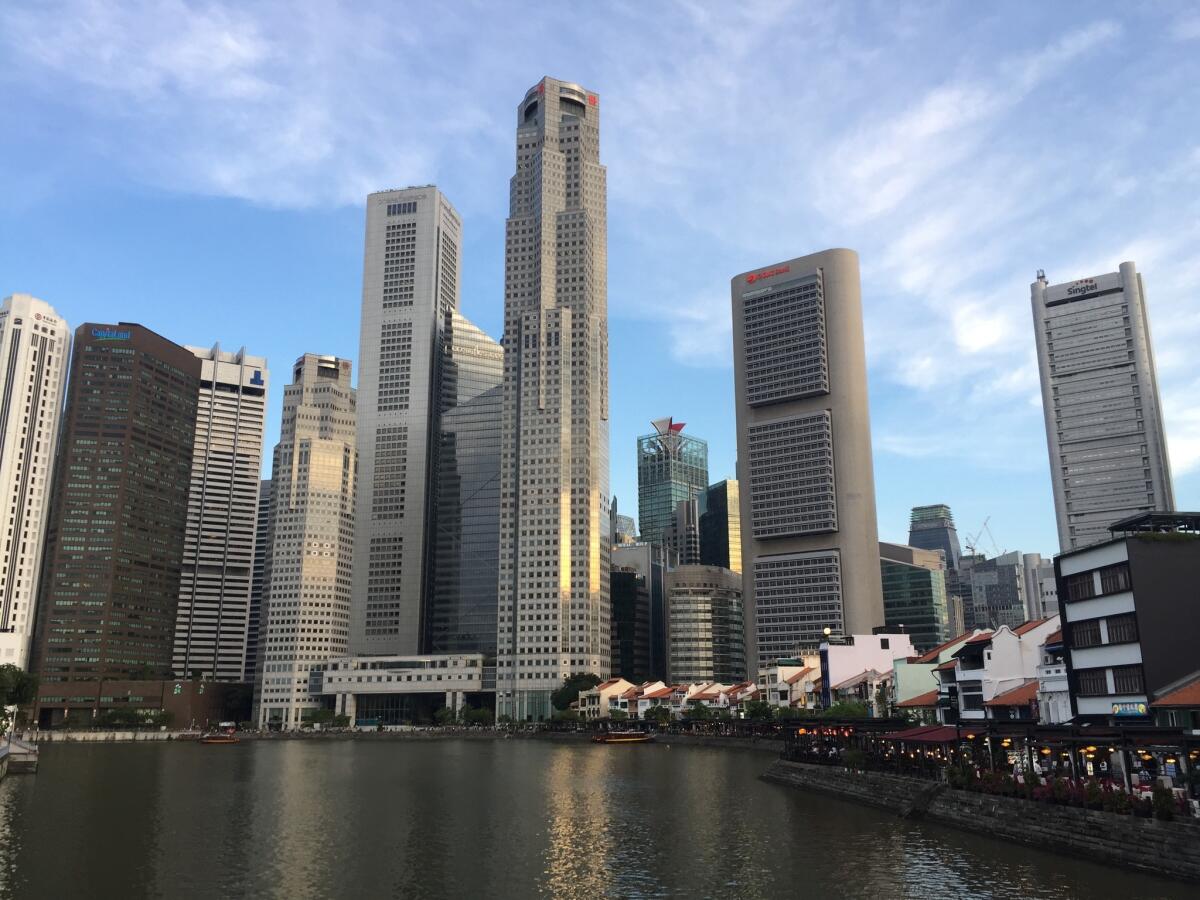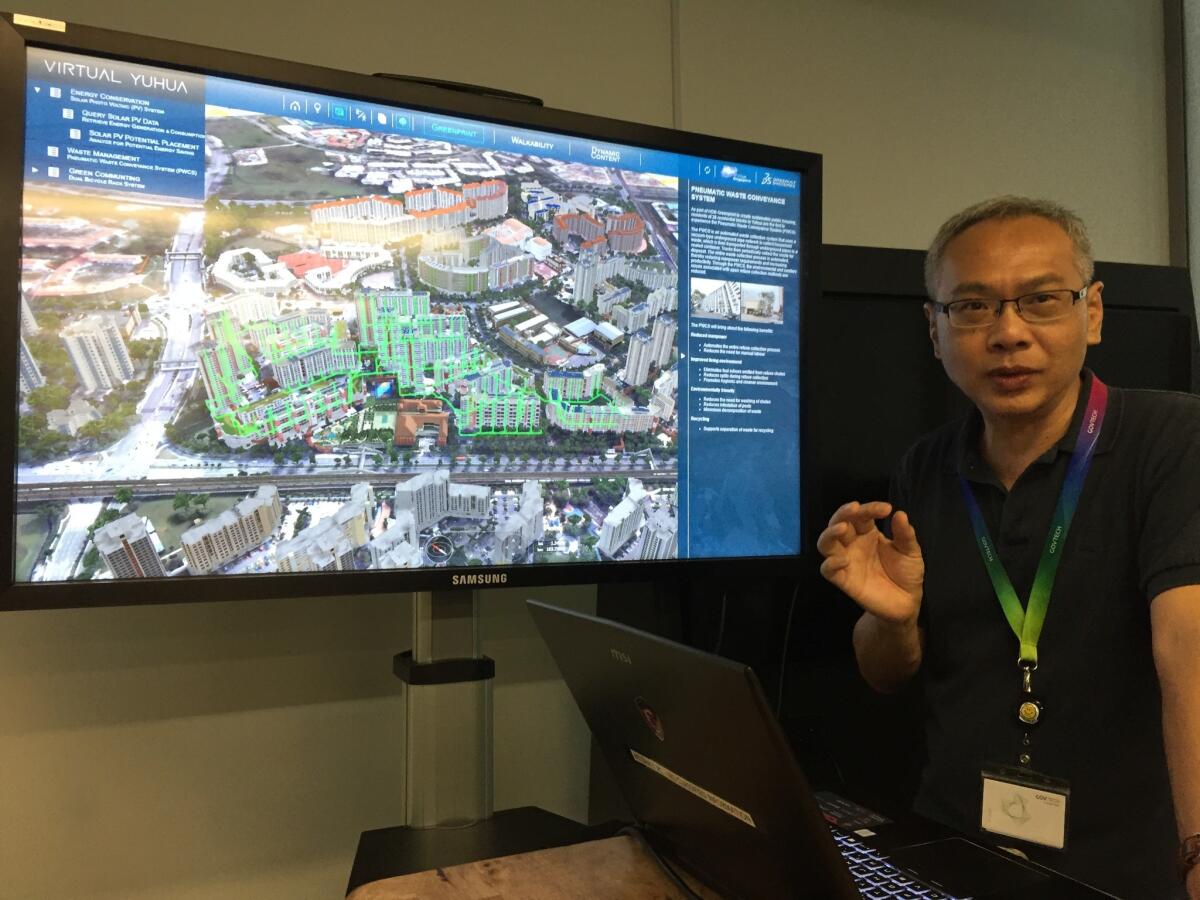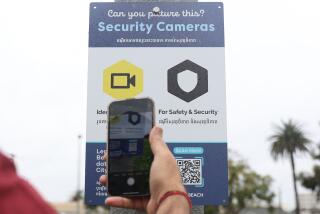Singapore has an idea to transform city life — but there may be a privacy cost

- Share via
Reporting from Singapore — This tiny island on the equator peeled away from Malaysia a half-century ago, an experiment in governance that willed itself into a global financial capital. Now Singapore is trying another experiment, one that could transform cities around the world.
A government initiative, known as Smart Nation, aims to use an untold number of sensors and cameras to track everything from someone smoking in a prohibited space to the number of vehicles on the road.
These sensors are the tentacles of an elaborate, integrated plan that could redefine how cities use technology to improve society — and offer the potential for government to monitor its citizens in a whole new way.
Such a project could ultimately determine how commuters get from Canoga Park to Culver City. But as the most wide-ranging effort yet to cull data on daily life, it will inevitably raise privacy concerns among those who believe that government surveillance is inherently problematic.
“We want Singapore to be the place to test-bed ideas and new ways to do things,” Vivian Balakrishnan, Singapore’s minister for foreign affairs and head of Smart Nation, said in an email. “Not only to benefit our citizens and businesses, but also to potentially create solutions for other cities.”
This affluent city-state of glass towers and manicured parks has always been one for rules, where security and efficiency usurp civil liberties like free speech. (Singapore famously restricts gum chewing in favor of clean streets.)
Its free-trade policies and lauded education system have helped make a city of 5 million — more than three times smaller than the Los Angeles metro area — one of the richest in the world. At the same time, Singapore faces the realities of limited resources, low birth rates, an aging population and rising protectionism.
The United Nation estimates that 66% of the world’s population will live in cities by 2050. Smart Nation may serve as a model, but it’s also a lifeline.
“If we don’t change, we’ll suffer,” said Jeffrey Koh, 55, a cafe owner whose coffee grew cold as he scanned a newspaper full of stories about the plan.
Prime Minister Lee Hsien Loong unveiled the digital initiative in 2014, describing it as a collaboration with the private sector to fuel the economy and better the lives of Singaporeans — from when they see the doctor to how they pay their bills. He upped the urgency this year, setting up a department within the prime minister’s office to oversee coordination.
Singaporeans are resigned to the large amount of data the government collects.... They see it as safe.
— Kirsten Han, an activist and journalist in Singapore
Authorities are working on cashless payments and a single digital identification to streamline transactions. They’ve set aside more than 40 miles of road for the development of self-driving vehicles.
Thousands of sensors scattered across the city help determine how to reroute public transport based on passenger loads or detect when someone has tossed a soda can on the ground. One voluntary program tracks the movements of elderly people at home through wireless sensors, and can inform families when their parent uses the bathroom or stops moving.
Officials even plan to track the spread of an infectious disease or predict the reaction of a frantic crowd to a terrorist attack. The system is still unfolding, they say, so its full possibilities are still unknown.
“We have seen these types of initiatives in the U.S. before, but not at the scale of an entire nation,” said Deland Chan, a lecturer in urban studies at Stanford University.
Los Angeles has launched a database that helps officials identify dirty streets. New York uses air quality sensors that gauge the impact of cars and other pollutants. Numerous cities have started projects to monitor traffic or health inspections at questionable restaurants.

Singapore’s system is far more centralized.
“What Singapore will provide is that sort of example and case study effectively for the world to say, ‘Those guys got value out of this, could we?’” said Raj Vaswani, co-founder of Silver Spring Networks, a San Jose company that provides smart grid products used in the initiative.
But the government’s digital utopia also looks like a hacker’s treasure chest filled with the gems of medical data and personal identification numbers. For privacy advocates, it instills panic.
“If what Singapore is doing is not about identifying people but monitoring temperature or whether there’s a radon leak, that’s fine,” said Adam Schwartz, senior staff attorney for the Electronic Frontier Foundation, a San Francisco-based digital rights group. “But if they’re gathering information in public on people and places, that’s surveillance and troubling.”
Balakrishnan, the minister leading Smart Nation, said the government has set up a cybersecurity agency to ensure the protection of information and has measures to govern its use. It does not build systems to collect data before deciding what to do with it, he said.
But the initiative hits on a tension inherent in the development of digitally connected cities. How much personal privacy should citizens sacrifice for the sake of convenience and safety?
“Singaporeans are resigned to the large amount of data the government collects,” said Kirsten Han, an activist and journalist in Singapore. “Residents don’t see CCTV as scary. They see it as safe.”
This is a democracy with deep faith in government, a driving principle throughout its five decades of existence — all under one party. Lee Kuan Yew, Singapore’s founder, told the Straits Times in 1987 that society would not have prospered if “we had not intervened on very personal matters: who your neighbor is, how you live, the noise you make, how you spit, or what language you use.”
Documents that restrict what officials can do with personal data are classified.
“Singapore’s legislation is not as much about the right to privacy to protect someone from the public gaze as it is a set of tools to manage the flow of information,” said Simon Chesterman, dean of the National University of Singapore’s law school.
The future Singapore envisions is displayed in an open-space office with white boards and giant bouncy balls. A screen shows the city-state in 3-D, a SimCity with data so comprehensive it can count the number of bike racks in an apartment complex.
This feature, which resembles a Google Maps on steroids, is the crux of the system. It will suck up sensor data so officials can see where a wheelchair ramp should go or simulate escape routes from a burning building. The $73-million endeavor, built by French software company Dassault Systemes and developed in conjunction with universities and private companies, will launch next year.
Many Singaporeans trust the plan as a valuable step for their unique nation, with the same comfort of people accepting the dense terms of service to access favorite apps.
“If you think about it, nothing’s quite safe,” said Jeannine Foo, 39, as she boarded a bus. It appeared exactly when the digital map behind her had predicted.
Meyers is a special correspondent.
Twitter: @jessicameyers
ALSO
Navy relieves commander of U.S. 7th Fleet after latest collision near Singapore
World’s first self-driving taxis debut in Singapore
Get ready to rumble: Taiwan’s legislative battles feature punching, shoving and tackling
More to Read
Sign up for Essential California
The most important California stories and recommendations in your inbox every morning.
You may occasionally receive promotional content from the Los Angeles Times.













